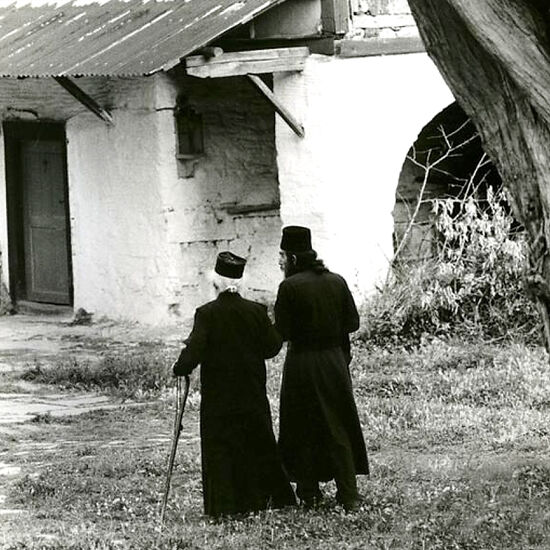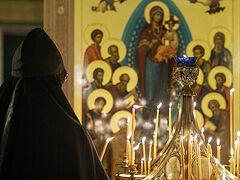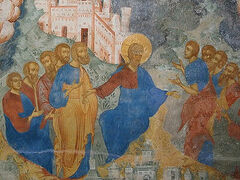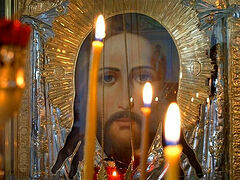The first word of your father-confessor is the will of God
Relations with your father-confessor should be natural. We cannot force our father-confessors to think for us. I have seen people who resorted to several father-confessors simultaneously in the hope that at least one of them would give them an answer that suited them. The saints used to say that the right answer comes with the first word of the father-confessor, whether you like it or not. And then you shouldn’t try to bargain or think what would be good anymore. It is said that the will of God is revealed in the first answer of our father-confessor.
And yet it is quite hard to speak about the will of God, even in the case of our father-confessor’s answers. in the Old Testament you can read a story about Prophet Elias, where he raises a Shunammite woman’s son from the dead. After her son had died, this widow returned to Prophet Elias with a broken heart. And St. Elias said, For her soul is vexed within her: and the Lord hath hid it from me, and hath not told me (4 Kings 4:27). We see that sometimes the will of God is not revealed even to saints. We should not demand that our father-confessors be clairvoyant, nor should we run around in search of clairvoyant father-confessors. The main thing you should look for is that your father-confessor is the personality who will change you.
And it is not a legal bargain that will be the final word. “I committed such-and-such a thing, received a penance, and left.” This formal and legalistic aspect is not the final word in obedience. It is love, love in spiritual guidance that has the final word. That’s how Moses prayed: Yet now, if thou wilt forgive their sin; and if not, blot me, I pray thee, out of Thy book which Thou hast written (Exod. 32:32). That’s how he prayed!
It was related about Abba Longinus that when his disciple Abraham fell into a certain passion, Abba Longinus stood up so that God could see him, and said to Him:
“Whether you like it or not, he must be forgiven.”
He must be forgiven! And this order to God stems from love. This boldness towards God stems from the love of the father-confessor for God and from his love for the disciple. After all, love has the last word!
The Holy Fathers focused not so much on the personality of the father-confessor as on this aspect, on the awareness of repentance. Why? Because the father-confessor is just a witness. This formula, which has existed in our country since about 1600, emphasizes that God Himself is the Absolver of sins.1 It is God Who absolves you of your sins.
There is a difference between confessing your thoughts to a monk who does not have the grace of the priesthood, and the Sacrament of Confession, during which we confess our sins before a priest-confessor. In our Romanian language there is one term for all clergy: “father” (“parintele”). In the Slavonic language, as you see, there is an “elder” (starets), and there is an “abbot” (igumen) who governs a monastery. An “elder” is a spiritual person. The Greeks also have a “geronda”.2
However, a whole theology has been compiled around thoughts, and a lot has been said about the power of thoughts. It has been said that “sin knocks at the door of the heart through the gate of thought.” Sin begins with thoughts, and once sins are confessed, and once they are exposed to the spiritual father, they no longer have their former power. Fr. Teofil used to say: “Even what is straight is twisted in a crooked mind.” Sin begins precisely with thought.
Yes, there is a difference between the past and modern practice of confession of thoughts. In those days, as St. John Climacus says, a monk would have a tablet on which he wrote down all the thoughts he had during the day and then went to confess them before his spiritual father. We could also do this, writing down our thoughts, and not necessarily on clay tablets, but on the “tablets” of our hearts, and confess them in the evening before going to sleep, when we say to God in the evening prayers: “Is this bed to be my coffin? Or wilt Thou enlighten my wretched soul with another day?” You see, how wonderful it is! It's as if our blanket, with which we cover ourselves, may turn out to be the last inch of the earth for us. This is an assessment of our thoughts for the day, which we could do before going to bed.
Obedience should bind you to Christ, not to your father-confessor
Obedience must be realized; “military obedience”, blind obedience, is out of the question whether in the world or in the monastery.
Obedience must be seen… Because there is the will of the old man, there is the last bastion in the heart of the old man. And from the moment he enters the monastery gate and crucifies himself (you see that monastic life is crucifixion, too), he must obey. Look at how the monastic tonsure is performed, how a candidate lies as if crucified with his arms outstretched in front of the holy doors and makes vows before God that he will live in chastity, in obedience, and in poverty. And the priest asks him:
“Dost thou see whom thou art making vows to?”
Because he is making vows, he is free to become a monk or not. You see? We’re talking about freedom! And what’s more, he tells him:
“When the monastic cross takes place, perhaps people won’t understand you, they’ll ridicule, insult and persecute you. When all this happens, rejoice!”3
This is so that you will rejoice when you bear such a cross!
There is a story I like in the Patericon, in which the devil came to a monk and tried to tempt him by saying meaningless things. The Devil asked him:
“What are you doing here in the cell? What are you doing here within four walls?”
The monk was almost broken. But an angel of God came and told him:
“When the evil spirit comes to ask you again, tell him: ‘I am holding up the walls for Christ’s sake.’”
And I realized that both in the world and in the monastery, we sometimes hold up the walls for Christ’s sake. We are holding up the walls of the family so that it can be preserved to the end; the walls of society, which are shaken; the walls of the world, which no longer knows the beauty of Orthodoxy; and we, each one in our place, uphold the walls of decency.
Yes, a monk sacrifices himself. But if he understands that this self-sacrifice is nothing other than the crucifixion of the will of the old man inside him (after all, man fell by his own will; all the evil of man comes through following his will, through following his egoism: “I know”, “I do”—through the worship of your own self. Elder Paisios said that obedience is no longer bondage, but a key that opens the heart to the air and the Kingdom of Christ. Through obedience, we can heal our soul from our passionate will and attachment to ourselves.
And in the world, they say, we are not necessarily called to obey as monastics do. Because many people in the world would like to have father-confessors who would indulge their whims. They look for father-confessors who would do their will, whereas a father-confessor should be a mirror—just as you look at yourself in the mirror to see if you are dressed beautifully, you should look at your soul in the mirror of your father-confessor and not demand that he says what you like.
It is also important not to have an unhealthy attachment here. Although confession is therapy, there is more to it than that. It should bind you to Christ, not to a father-confessor. Because sometimes we feel at ease, thinking: “I do a certain thing, and I have the blessing of my father-confessor.” And we get “the blessing of our father-confessors” for all the little things of life. But in fact, we should first of all make our souls transparent, acquiring wisdom so that we can choose for ourselves, standing firmly on our own feet; because at the Last Judgment Christ will ask us about what we ourselves have done.
And so, your father-confessor’s greatest gift to you should not necessarily bind you to him. The greatest gift is the gift of freedom—freedom that is not used chaotically, but is directed towards Christ. And a good father-confessor does not necessarily bind you to himself by obedience; he gives you spirit, spiritual air—something that changes your life.
Some people say, “I don’t need to go a father-confessor, because I go to a psychotherapist”. But there is a big difference here. I think we are not the first and not the last to pose this question. Even St. Basil the Great in the fourth century (can you imagine that?) posed this problem to himself and said: “Let us give the doctor what is of the body and give the priest and the Church what is of the soul.”
Each of them does his job. We cannot blame either of them when they think that they act for the benefit of man by their own specific means, and that they bring specific fruits. The fruits are obvious! But a father-confessor, a disciple, and Someone else are present at confession and in spiritual guidance! “Behold, I am just a witness to what you will tell me.” You confess precisely before Christ, and He covers the father-confessor’s inexperience and the shame and fear of the one who comes to confession.
As for the question of whether obedience today is the same as it was before. Formerly there was real obedience. In the Patericon, we read that an Abba planted a dry tree trunk and watered it for three years. He would go in the morning to water it, then return and water it again, and soon the evening would fall. After three years, the dry trunk burst into blossom. But we cannot demand this from a disciple! In the Patericon, there are tests of obedience, of the holiness of disciples, and of the holiness of father-confessors.
To be continued...




